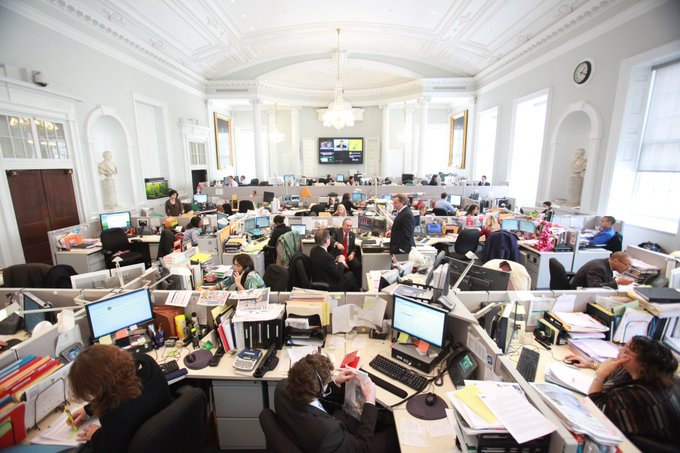-— Umberto Eco, born in 1932
A group of friends went deer hunting and paired off in twos for the day.
That night, one of the hunters returned alone, staggering under the weight of an eight point buck.
“Where’s Henry?” one of the men in camp asked.
“Henry had a stroke of some kind. He’s a couple of miles back up the trail.”
“You left Henry laying out there and carried the deer back!?!”
“A tough call,” nodded the hunter, “but I figured no one is going to steal Henry!”
SPYING: The Crazy Story of How Soviet Russia Bugged an American Embassy’s Typewriters
It's 2020. You're old. "Remember when Jurassic Park, The Lion King, and Forrest Gump came out in theaters? Closer to the moon landing than today."
Nell Zink: “Dead writers are open yet thick-skinned, supreme angels of self-assurance, impossible to scare off — just the kind of friends I like best
ALLAN KESSING. Mendaciously Manufacturing Consent
Of the various national groupings, political (EU), economic (EFTA), religious (OIC), or linguistic (ex-colonies) that of the Anglophone countries, exemplified by the FIVE EYES intelligence sharing, is unique – its members being so similar yet so different.
Four are Constitutional monarchies with parliamentary government determined by control of the Legislature Chamber, three use the antiquated FPtP electoral system, two have PR/STV and one compulsory voting. Continue reading
THAT COMPORTS WITH MY EXPERIENCE: Missed sleep may increase appetite, studies say.
CAMERON LECKIE. The Australian Mainstream Media: Propagandists on Chemical Weapons
One of the most effective tools of the propagandist is the power of leaving out.Continue reading
Expressions like Czechoslovak Anthrax to me are as strong as thevAustralian Smoko ...Once I believed my Tato was made of steel. My Tato went from greeting the morning from "Good morning, God!" to greetings which were morelike, "Good God ... Morning?"
bored panda – And There’s No Reason Not To Use Them – “It seems like most of the news we hear about libraries lately is discouraging, with usage declining and funding being denied. Most people’s first assumption would be that it’s an expected consequence of how people use technology
The New York Times – From smart homes to ultrafast wireless speeds, here’s what to watch – “Tech is in our homes with thermostats that heat up our residences before we walk through the door. It’s in our cars with safety features that warn us about vehicles in adjacent lanes. It’s on our television sets, where many of us are streaming shows and movies through apps. We even wear it on ourselves in the form of wristwatches that monitor our health. In 2020 and the coming decade, these trends are likely to gather momentum. They will also be on display next week at CES, an enormous consumer electronics trade show in Las Vegas that typically serves as a window into the year’s hottest tech developments
ProPublica Database to Investigate Professors’ Conflicts of Interest- ProPublica: “When professors moonlight, the income may influence their research and policy views. Although most universities track this outside work, the records have rarely been accessible to the public, potentially obscuring conflicts of interests. That changed last month when ProPublica launched Dollars for Profs, an interactive database that, for the first time ever, allows you to look up more than 37,000 faculty and staff disclosures from about 20 public universities and the National Institutes of Health. We believe there are hundreds of stories in this database, and we hope to tell as many as possible. Already, we’ve revealed how the University of California’s weak monitoring of conflictshas allowed faculty members to underreport their outside income, potentially depriving the university of millions of dollars. In addition, using a database of NIH records, we found that health researchers have acknowledged a total of at least $188 million in financial conflicts of interest since 2012. We hope journalists all over the country will look into the database and find more. Here are tips for local education reporters, college newspaper journalists and anyone else who wants to hold academia accountable on how to dig into the disclosures…”
ProPublica Database to Investigate Professors’ Conflicts of Interest- ProPublica: “When professors moonlight, the income may influence their research and policy views. Although most universities track this outside work, the records have rarely been accessible to the public, potentially obscuring conflicts of interests. That changed last month when ProPublica launched Dollars for Profs, an interactive database that, for the first time ever, allows you to look up more than 37,000 faculty and staff disclosures from about 20 public universities and the National Institutes of Health. We believe there are hundreds of stories in this database, and we hope to tell as many as possible. Already, we’ve revealed how the University of California’s weak monitoring of conflictshas allowed faculty members to underreport their outside income, potentially depriving the university of millions of dollars. In addition, using a database of NIH records, we found that health researchers have acknowledged a total of at least $188 million in financial conflicts of interest since 2012. We hope journalists all over the country will look into the database and find more. Here are tips for local education reporters, college newspaper journalists and anyone else who wants to hold academia accountable on how to dig into the disclosures…”
As president, I'll turn the East Room into an open office plan, where I’ll sit with our team. I’ll use the Oval Office for some official functions – never for tweeting – but the rest of the time, I’ll be where a leader should be: with the team.politi.co/2tbPhLl pic.twitter.com/jLwWKJCmxw
| ||
IS THERE NOTHING IT COULDN’T DO?! Fireworks: Nearly Half Of Americans Had Best Sex Of Their Lives In 2019, Survey Finds
